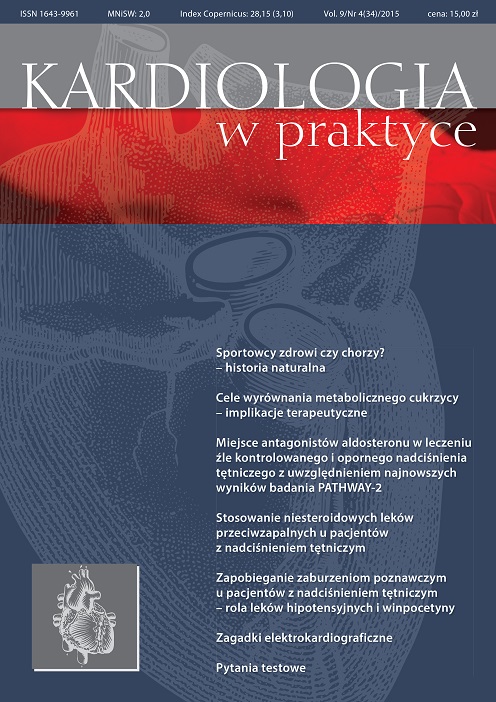Aims of metabolic control in diabetes – therapeutic implications Review article
Main Article Content
Abstract
Diabetes is a metabolic disorder characterized by hyperglycemia. Poorly controlled diabetes leads to multiple organ complications (mainly eyes and heart) and can affect many systems – nerves, small and large vessels – that result in target organ failures (such as eyes, heart, kidneys). Multifactorial approach is necessary to achieve metabolic control in diabetes. That includes changes in lifestyle, reduction in body mass index as well as hypoglycemic, hypotensive and lipid-lowering therapy.
Downloads
Article Details

This work is licensed under a Creative Commons Attribution-NonCommercial 4.0 International License.
Copyright: © Medical Education sp. z o.o. This is an Open Access article distributed under the terms of the Attribution-NonCommercial 4.0 International (CC BY-NC 4.0). License (https://creativecommons.org/licenses/by-nc/4.0/), allowing third parties to copy and redistribute the material in any medium or format and to remix, transform, and build upon the material, provided the original work is properly cited and states its license.
Address reprint requests to: Medical Education, Marcin Kuźma (marcin.kuzma@mededu.pl)
References
2. Implications of the Diabetes Control and Complications Trial. Diabetes Care 2002; 25: 25-27.
3. Implications of the United Kingdom Prospective Diabetes Study. Diabetes Care 2003; 26: 28-32.
4. Gaede P., Vedel P., Larsen N. et al.: Multifactorial intervention and cardiovascular disease in patients with type 2 diabetes. N. Engl. J. Med. 2003; 348(5): 383-393.
5. Patel A., MacMahon S., Chalmers J.; ADVANCE Collaborative Group: Effects of a fixed combination of perindopril and indapamide on macrovascular and microvascular outcomes in patients with type 2 diabetes mellitus (the ADVANCE trial): a randomised controlled trial. Lancet 2007; 370: 829-840.
6. Patel A., MacMahon S., Chalmers J. et al.; ADVANCE Collaborative Group: Intensive blood glucose control and vascular outcomes in patients with type 2 diabetes. N. Engl. J. Med. 2008; 358: 2560-2572.
7. The ACCORD Study Group: Effects of Intensive Blood-Pressure Control in Type 2 Diabetes Mellitus N. Engl. J. Med. 2010; 362: 1575-1585.
8. Duckworth W., Abraira C., Moritz T. et al.: Glucose control and vascular complications in veterans with type 2 diabetes. N. Eng. J. Med. 2009; 360: 129-139.
9. American Diabetes Association: Standards of Medical Care in Diabetes – 2015. Diabetes Care 2015; 38: 86-87.
10. Wytyczne ESC dotyczące cukrzycy, stanu przedcukrzycowego i chorób układu sercowo-naczyniowego opracowane we współpracy z EASD. Kardiologia Polska 2013; 71(supl. XI).
11. Zalecenia kliniczne dotyczące postępowania u chorych na cukrzycę 2015. Stanowisko Polskiego Towarzystwa Diabetologicznego. Diabetologia Kliniczna 2015; 4(supl. A).

